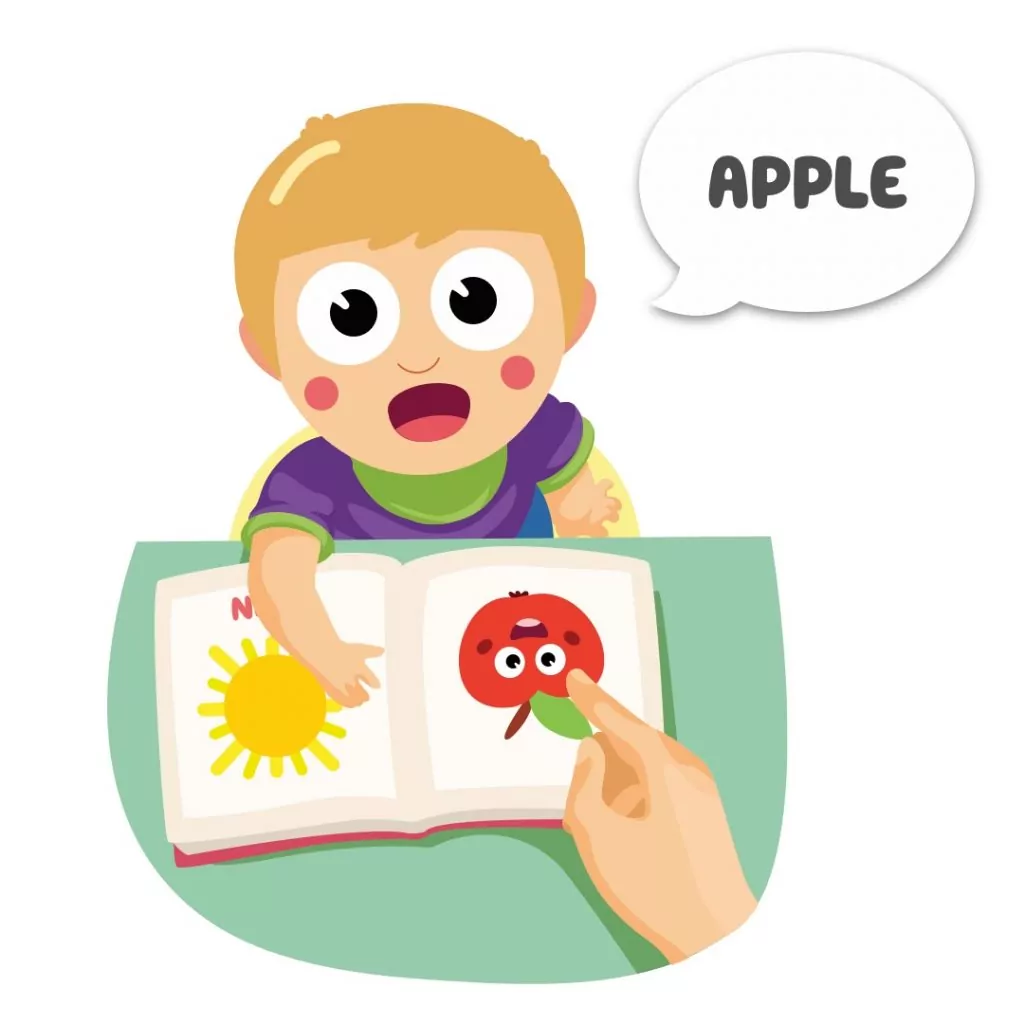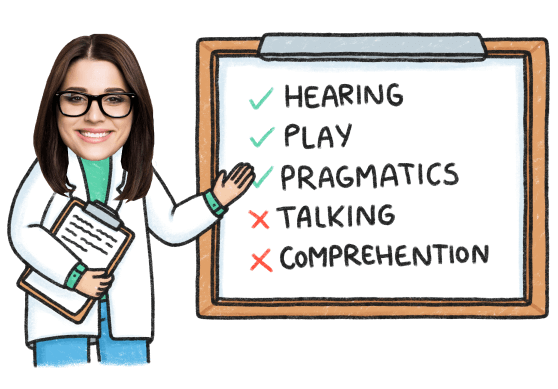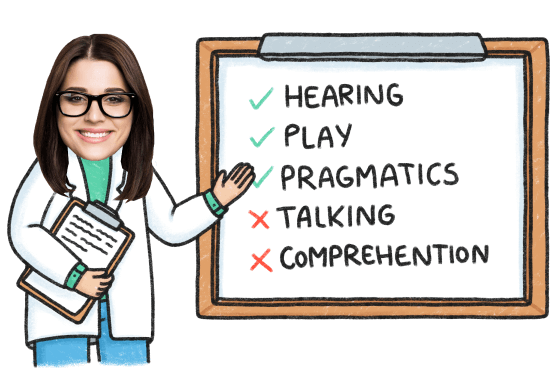Can Children on the Autism Spectrum have Apraxia of Speech?
Feb 11, 2022 We are answering parent's question: "My 2 years old son doesn't talk, just babbles. The doctor said it could be autism or apraxia. How come they don't know what it is?"
So first things first, your child can be diagnosed with Autism AND have apraxia of speech at the same time. Can both disorders happen independently of each other? Yes. However, research is showing that children who are on the spectrum, have an increased risk of also having apraxia of speech.
Apraxia is a relatively rare disorder, however, it affects around 65% of children with Autism (Autism Speaks). This finding urges parents who have a child diagnosed with one disorder to also be evaluated for the other disorder. This is especially true if your child isn’t making gains in their communication goals.
Boost Your Child’s Speech Development!
Improve language & communication skills with fun learning!

Recognizing Speech Apraxia
What is it? How do I know if my child has apraxia? Children with apraxia have difficulty coordinating the use of their tongue, lips, mouth, and jaw to produce clear and consistent speech sounds. So each time they say a word, it may sound different, every single time.
Because of this inconsistency, it can be difficult even for parents – who know their children’s speech idiosyncrasies – to understand the child. This means that unfamiliar listeners, the woman at the grocery store or a teacher, will have even more difficulty understanding what your child is trying to communicate.
Even for specialists, it can be a challenge to determine why a child is having difficulty speaking. This challenge is made more complicated when he or she has a developmental disorder such as autism that likewise involves communication challenges. This is why I’m not surprised that the medical professional in the question wasn’t sure which disorder is playing a role in the communication issues.
If you have questions or concerns, it is very important that you seek out an evaluation by a speech-language pathologist. These individuals are trained to determine the key signals of each disorder to figure out what the underlying issue is. They are also trained to create a specialized and individualized plan for your child to target specific goals.
What to Expect with the Evaluation
As I mentioned before, a speech-language pathologist will look for certain behaviors to distinguish apraxia from other communication disorders. Some of these key items may include:
- Inconsistent errors with consonants and vowels when pronouncing syllables and words. For example, the child says the same word slightly differently each time. This may be particularly obvious with new words and longer, more-complex words.
- Difficulty moving from sound to sound and syllable to syllable. This tends to result in rather long pauses between sounds and syllables. Related to this, the child may have difficulty repeating a string of words or syllables.
- Unusual emphasis on parts of speech. For example, a child may pronounce all the syllables in a word or sentence with equal stress. So instead of the usual “melody” of speech, the child’s speech sounds odd. It can be particularly difficult to distinguish this symptom of apraxia from the very similar “flat” speech intonation that’s common among those who have autism.
During the evaluation, the speech-language pathologist will also assess a child’s oral motor strength and movements. This involves evaluating the movements of the jaw, lips and tongue. He or she may ask your child to swallow, move her tongue, pucker, smile, lick a lollipop and so on, while checking the coordination of muscle movements.
A thorough evaluation also includes assessments of a child’s hearing, verbal and nonverbal communication skills and ability to imitate and respond to instructions. The results of these evaluations can provide important guidance in the development of your child’s treatment plan.
7 Speech Activities You Can Do at Home
While therapists are the main source of therapy for your child, it’s also important for you to work on these skills in the home and community environments.
1. Model the words and give examples.
Pick up an object that your child wants. Hold it next to your mouth and clearly say what it is. For example, “Toy train. You would like the toy train?”
Repeat the label again, then give it to your child. This strategy encourages her to see her mouth movements and associate them with getting what she wants.

2. Use a variety of common objects to amplify or change your voice in ways that draw your child’s attention.
For example, say something to your child through an empty paper-towel roll or voice-changer app. See if your child will respond or make a sound in return. Praise any effort. Back and forth imitation is your goal.
3. Offer your child a choice of two items.
Again while holding them near your mouth as you clearly say what they are. This encourages her to use the right word or at least point to what she wants. For example, “Do you want an apple or an orange?” If she says or points to the apple, you repeat “You would like the apple.”

4. Give your words some excitement!
Emphasize sounds at the beginning or end of words. Again, your goal is to get your child to pay attention and imitate.
5. Make sound effects.
Get in the feeling when reading books or playing with toys. Everyone can make mooing and airplane sounds! Change your volume and pitch.

6. Frequently repeat “core words” in a simple sentence or activity description.
Do this while engaging with your child in a fun way. For example, when blowing bubbles, use and emphasize such core words as “bubble,” “blow,” and “pop.”
Focus on the same words with the same activity each day. Keep the words simple. Keep sentences short. Pause before repeating the action or giving the desired object to encourage your child to repeat the word.
7. Encourage imitation with songs.
Many songs have motions that go along with them. “If You’re Happy and You Know It” (clap your hands, stomp your feet), ‘Itsy Bitsy Spider’ etc. Something about music engages children in ways that encourage them to attend to your mouth and movements.
Have a question for our Speech Therapists?



Just read your articles about autism and apraxia. Very useful articles and has information i haven’t been able to find on the internet! I thought my son had apraxia as he says no words but he really tries to repeat things he will concentrate hard look at my mouth expressions and then try say it but all that comes out is “ahhhh” he tries again and becomes very frustrated. He doesn’t say any words on a day to day basis he turned 3 few weeks ago. He said “happy” at age 1 and “bye” twice at age 2 and “mummy” yesterday (so like 1 new word a year). He has great eye contact. Doesnt line up toys, he plays with everything and doesn’t fixate on any particular 1 toy. Some instructions he follows, others he doesnt. He points at anything he wants. On quizzes he knows his colors, shapes and objects. When i first downloaded the speechblubs app, he knew all the guess the words without me ever teaching him before! Its just he is not very vocal about the things he knows. The only repetitive behaviour he has is he claps alot.
He is due to be evaluated in a few weeks times. I think as a worried parent im just trying to figure it all out now which maybe is not wise.
Also he knows how to smile so probably not apraxia. Does it sound like he has autism? Also what are the signs for non verbal autism? By which age would it be determined the child is non verbal?
Thank you for your question and the compliment on our articles. I would suggest that you try and remain calm and see what happens when he gets evaluated. If he is going to be three and has only a few words, that can be just a speech delay. A speech delay does not mean he will be diagnosed with Autism. In children who are diagnosed with Autism, we look for specific behaviors such as:
1. Repetitive movements
2. Limited eye contact
3. Delayed/no speech or a regression in speech skills
4. Sensitivity to taste and touch
It sounds like your son is just displaying an issue with his expressive language. His understanding seems to be perfectly fine! Please keep us in the loop if you have any other questions or need clarification!
Stacie Bennett, M.S. CCC-SLP